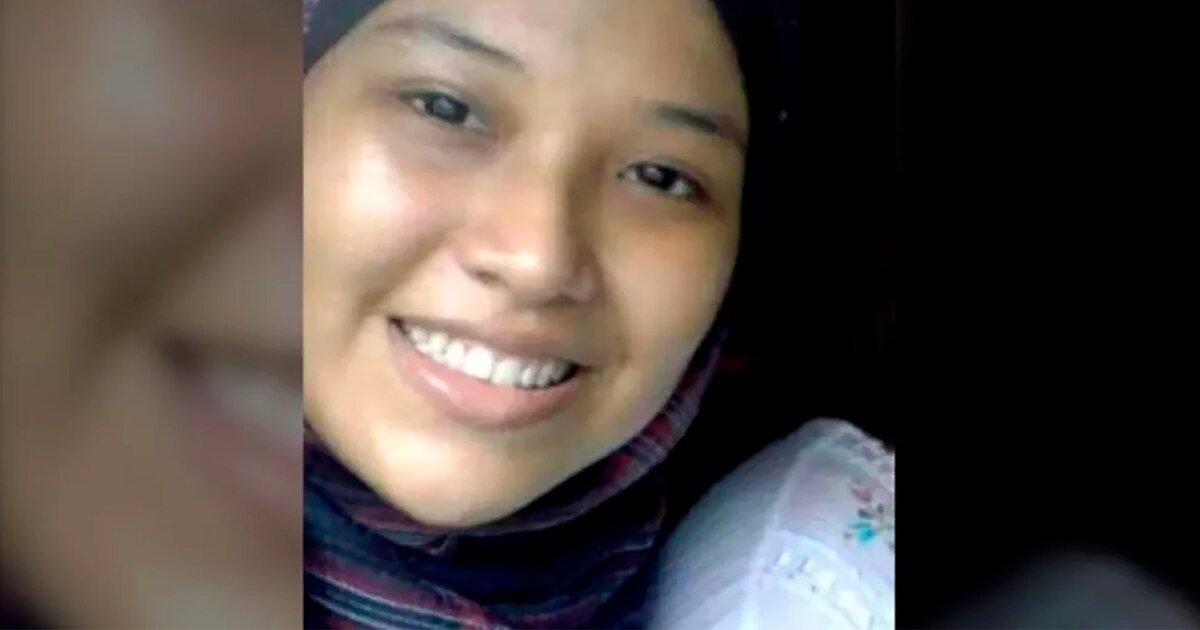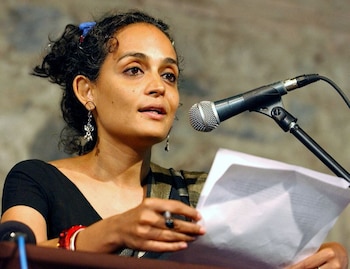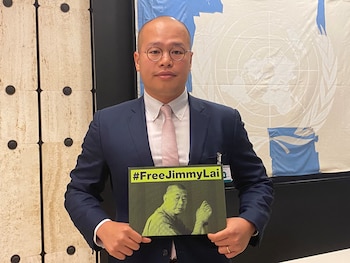INTERNACIONAL
La historia de Karina Barbosa, la brasileña que regresó a su país tras unirse al grupo terrorista ISIS en 2016

Karina Ailyn Raiol Barbosa, hoy de 28 años, regresó a Brasil esta semana después de nueve años, junto con su hijo nacido en Siria. Tenía 20 años en 2016 cuando, convertida al islam radical, abandonó el estado amazónico de Pará, de donde es originaria, para unirse al Estado Islámico en Siria. La estudiante de periodismo de la Universidad de Belém, en Pará, que se había convertido dos años antes en la mezquita local gracias a un curso de árabe, se radicalizó a través de Internet. El día de su huida, le dijo a su familia que iba a la universidad. La Policía Federal brasileña logró reconstruir su largo viaje hacia el ISIS. Primero Marruecos y luego Estambul, en Turquía, donde los combatientes extranjeros encontraban fácilmente pasadores para cruzar la frontera y llegar a Siria, en llamas por el radicalismo islámico.
Luego se perdió el rastro de la joven. El registro de una brasileña encontrado en una madafa en Siria, las casas en las que el Estado Islámico confinaba a mujeres para ser seleccionadas como esposas por sus combatientes, terminó en nada. Solo en 2018 el Ministerio de Asuntos Exteriores brasileño confirmó que había sido informado de su detención en una zona desconocida controlada por los kurdos en el norte de Siria. Luego pasó de una prisión a otra hasta llegar al campo de Al Roj, en el noreste de Siria. En 2020, la Defensoría Pública de la Unión presentó una demanda ante la Justicia Federal solicitando que el Gobierno brasileño prestara asistencia a la joven y a su hijo. A principios de 2025, la magistratura aceptó la solicitud y ordenó su repatriación. Dado que en Brasil la mujer no fue acusada de terrorismo ni sospechosa de ningún delito, pudo regresar a su casa en Pará junto con su hijo.

El periodista de la cadena de televisión brasileña Record Yan Boechat, que ha viajado repetidamente a Siria, siguió de cerca su caso. En 2019, las fuerzas kurdas le confirmaron que “al menos seis brasileños estaban prisioneros en Siria. Pero el Gobierno brasileño solo tenía conocimiento del caso de Karina”. Los familiares de la joven le contaron al periodista su progresivo aislamiento antes de la fuga y cómo últimamente se había encerrado en su habitación conectándose constantemente al ordenador y radicalizándose en Internet, como les ocurría en aquella época a muchos jóvenes europeos, hombres y mujeres, que buscaban un islam que definían como “puro”, pero que en realidad era radical. “No nos dábamos cuenta de lo que estaba pasando, simplemente no veíamos que Karina estaba tomando un camino muy diferente al que habíamos imaginado”, cuenta al periodista su hermana Karen Rayol. Seis meses después de huir de Brasil, Karina se puso en contacto con su familia para decirles que se encontraba en Idlib, Siria, y que se había casado con un joven que había conocido en Internet, un yihadista casado con otras tres mujeres que, según Boechat, “la maltrataba continuamente”.
La joven volvió a desaparecer hasta que se puso en contacto con su familia en 2017 desde Raqqa, donde contó que se había vuelto a casar y que estaba embarazada. El periodista intentó reunirse con ella el año pasado, pero fue en vano, en el campo de Al Roj, gestionado por los kurdos y donde fueron trasladadas 3.000 mujeres y niños acusados de formar parte del Estado Islámico. “Según el director del campo, Haval Rasshed, ella y otras diez mujeres establecieron contacto con excombatientes del ISIS e intentaron huir a Turquía”, para luego ser detenidas por los kurdos y llevadas a una prisión de máxima seguridad, reveló Boechat. “La inteligencia kurda habría encontrado un teléfono móvil, mapas y conversaciones sospechosas. Ninguna de estas informaciones puede confirmarse, ya que en Rojava ninguno de los extranjeros acusados de haber formado parte del ISIS es sometido a un proceso judicial independiente. Vale lo que se cuenta”, concluyó el periodista.

A diferencia de otros lugares de América Latina, como Trinidad y Tobago, que en proporción a su número de habitantes ha producido el mayor número de combatientes extranjeros de las Américas que han luchado en las filas del Estado Islámico, Brasil ha enviado pocos, entre cuatro y seis según diversas fuentes, y todos ellos, al parecer, nunca han regresado a casa. Sin embargo, ya en 2014 se encontraron documentos brasileños en un campo de entrenamiento de Al Qaeda. El caso de los hijos de emigrantes brasileños es diferente. Kaique Luan Ribeiro Guimaraes, residente en Cataluña desde los ocho años, fue detenido en 2014 a los 18 años cuando, junto con dos marroquíes, intentaba entrar en Turquía para luego llegar a Siria. Nacido en el seno de una familia neopentecostal, originaria de Formosa, en el estado brasileño de Goiânia, se había convertido en un centro cultural islámico en las afueras de Barcelona con el nuevo nombre de Hakim. Según la acusación de la fiscalía española, era miembro de una célula yihadista que reclutaba a jóvenes en las cercanías de Barcelona para cometer un atentado. En 2018 fue condenado a ocho años de prisión. Por su parte, Brian de Mulder, hijo de una brasileña, logró alistarse en las filas del ISIS en 2013 con el nombre de Abu Qassem Brazili, el brasileño. Nacido en Bélgica, en Amberes, comenzó a acercarse al mundo islámico con algunos migrantes marroquíes con los que jugaba al baloncesto y a frecuentar Sharia4Belgium, una organización ahora disuelta y declarada terrorista por la justicia belga. Su muerte en combate fue anunciada a la familia en noviembre de 2015 por su esposa Sara, con quien se había casado en Siria. Tenía 22 años.
En 2016, poco antes de los Juegos Olímpicos de Río de Janeiro, las autoridades brasileñas detuvieron, con la operación Hashtag, a una red de jóvenes brasileños acusados de preparar una serie de atentados que se llevarían a cabo durante el evento deportivo. Algunos de ellos habían intentado anteriormente viajar a Siria. Uno de ellos solo consiguió llegar a Turquía, mientras que otro fue rechazado por las autoridades de Arabia Saudí y se trasladó a Egipto, donde estudió árabe junto con otro joven también implicado en la operación. En 2018, la operación Atila de la Policía Federal brasileña reveló la existencia de una célula internacional hispano-brasileña acusada de reclutar personas para Siria y de planear atentados durante el carnaval de Río de Janeiro y Salvador. Más recientemente, el 11 de junio de 2023, fue detenido por la policía brasileña en el aeropuerto internacional de San Pablo-Guarulhos cuando intentaba unirse al ISIS en Turquía. Fábio Samuel Da Costa Oliveira, un brasileño de veinte años que se hacía llamar Mahmoud al Barazili, había planeado un atentado contra la embajada israelí en Brasilia. El joven, originario de Barbacena, en el estado de Minas Gerais, era simpatizante del ISIS y fue condenado a siete años de prisión por terrorismo y corrupción de menores, ya que intentó involucrar en sus planes a un adolescente.
Históricamente, Brasil ha atraído en el pasado a terroristas de gran calibre. El cerebro de los atentados de las Torres Gemelas, Khalid Sheikh Mohammed, y el propio Osama Bin Laden vinieron a Brasil antes de los atentados, a la Triple Frontera. El país también fue utilizado por Irán y su proxy Hezbollah para preparar los dos trágicos atentados de Buenos Aires en 1992 contra la embajada de Israel y en 1994 contra la Asociación Mutual Israelita Argentina (AMIA), en los que murieron 107 personas y cientos resultaron heridas.

También es controvertido el caso del físico franco-argelino Adlène Hicheur. Detenido en Francia en 2009, fue condenado en 2012 a cinco años de prisión, acusado de planear atentados en territorio francés. Una vez cumplida la condena, en 2013 llegó a Brasil, donde, gracias a una beca del Consejo Nacional de Desarrollo Científico y Tecnológico brasileño, impartía clases de física en la Universidad Federal de Río de Janeiro. El 15 de julio de 2016, las autoridades brasileñas, a pesar de las protestas de la comunidad académica local, lo expulsaron. El hombre siempre se ha declarado inocente. De regreso a Francia, renunció a su nacionalidad francesa y se fue a vivir a Argelia.
A lo largo de los años, la tecnología ha cambiado profundamente las formas de radicalización, incluso entre los brasileños. Hoy en día, la llamada web descentralizada permite reclutar a potenciales lobos solitarios entre los más jóvenes, de cualquier edad y clase social, como también ha revelado el grupo totalmente brasileño Comando 860, en el que se compartía propaganda del Estado Islámico y manuales de guerrilla y fabricación de explosivos. En diciembre de 2024, la Policía Federal brasileña detuvo a Thiago José Silva Barboza de Paula, acusado de mantener contactos con el Estado Islámico y de intentar reclutar a jóvenes para que se unieran al grupo terrorista, a través de este grupo. Los jóvenes brasileños radicalizados también utilizan las redes sociales abiertas, compartiendo a menudo contenidos de grupos neonazis en una mezcla ideológica totalmente fuera de control y, por lo tanto, peligrosa de llevar a la práctica.
En cuanto a la radicalización chiíta, se propaga principalmente a través de clérigos y centros culturales. Se espera que una nutrida delegación iraní acuda la próxima semana, los días 4 y 5 de septiembre, a Río de Janeiro, donde se celebrará la Conferencia de Líderes Religiosos de los Países BRICS, promovida por el Consejo Religioso de Musulmanes de la Federación Rusa, con el apoyo de la Universidad de Estudios Humanísticos Mohamed Bin Zayed (EAU) y la Federación de Asociaciones Musulmanas de Brasil (FAMBRAS). El año pasado se celebró en Kazán una reunión similar con líderes islámicos titulada “Quinta Conferencia Internacional ‘Ruta de la Seda Espiritual. La importancia de los valores religiosos en el Gran Espacio Euroasiático”. Este año también se espera la llegada a Brasil de Mohammad Ali Shomali. Shomali ocupó en el pasado el cargo de representante del ayatolá Khamenei en el Reino Unido durante su mandato al frente del Centro Islámico de Inglaterra (ICE), una mezquita londinense que fue investigada por la Comisión de Beneficencia del Reino Unido por su papel en la promoción del extremismo.
INTERNACIONAL
Ella fue la que enfureció, aterrorizó y moldeó a Arundhati Roy

A la larga y sonora lista de madres difíciles de la literatura —la Sra. Bennet; Joan Crawford; Rose Hovick; ¡vaya, Medea!—, ahora añadamos a Mary Roy. A la Sra. Roy, a ustedes. Y, lo más revelador, a su propia hija.
Esa hija es Arundhati Roy: la autora y activista india que irrumpió en la lista de los más vendidos en 1997 y ganó un Premio Booker a los 36 años por su primera novela, El Dios de las Pequeñas Cosas, la brillante historia de una familia atribulada. Su segunda novela, de mayor tinte político, El Ministerio de la Máxima Felicidad, se publicó 20 años después, tras numerosos libros de no ficción.
Esperemos que las nuevas memorias de Roy, Mother Mary Comes to Me, no sean la piedra angular de esta carrera poco convencional (estudió arquitectura y también escribió y actuó en películas), pero ciertamente es una piedra angular: sólida y pulida en su descripción de una monstruosidad fundacional.
Aunque carecía de riquezas materiales, la majestuosa Mary Roy emerge de estas páginas como una madre imperiosa y volátil, una “gánster” similar al famoso Roy de la televisión, Logan, de Succession: lanzando vajilla, profiriendo insultos y golpeando a su hijo, Lalith, por unas calificaciones mediocres, con una regla de madera hasta romperla. Él creció y prosperó como un extrovertido magnate de la pescadería, pero hasta el día de hoy su hermana, alabada por sus excelentes calificaciones, encuentra un poco incómoda la fama.

“Cuando me brindan o me aplauden, siempre siento que alguien más, alguien tranquilo, está siendo golpeado en la otra habitación”, escribe, y —asintiendo con la cabeza hacia su bien establecida conciencia social— “si te detienes a pensarlo, es cierto, alguien lo está siendo”.
La Sra. Roy falleció en 2022 a los 88 años. Aquejada de un asma terrible, en sus últimos años siempre la seguía un “súbdito asustado que llevaba su inhalador para el asma, como si fuera una corona o un cetro”. No solo prohibió las perchas de alambre; le contó a Arundhati (de soltera Susanna) que había intentado abortarla con una. Y como eso no funcionó, deseó haber abandonado a su hijo, “una piedra de molino al cuello”, en un orfanato.
“¡Fuera!” era un edicto frecuente, desde casa o en el coche. “¡Perra!”, exclamó Mary después de que Susanna, de 9 años, colgara accidentalmente su nuevo teléfono de baquelita durante una conversación.
Cuatro años después, la niña regresó a casa de un internado militar y encontró a su amada pastora alsaciana, Dido, llamada así por la reina de Cartago en la obra de Christopher Marlowe, muerta a tiros. El delito: aparearse con un perro callejero.
Veamos los puntos fuertes de este personaje complejo. Su Waystar Royco fue Pallikoodam, la renombrada escuela que fundó en un antiguo Rotary Club de Kottayam en 1967. Colaboró con un misionero cristiano, quien se marchó rápidamente tras la llegada de profesores de Bharatanatyam, una forma de danza clásica india (“pagano, anticristiano e inaceptable”, resopló el misionero). El intelecto de Mary era amplio y generoso: le contaba a su hija sobre los conflictos mundiales, leía a Rudyard Kipling y cantaba Ol’ Man River.
Tras reconstruir las nuevas instalaciones de la escuela en un terreno de tres acres, finalmente persuadió a la Corte Suprema de su país para que anulara una sentencia contra los estudiantes que interpretaban la ópera rock de Andrew Lloyd Webber y Tim Rice, Jesucristo Superstar. Ya había presentado una demanda con éxito contra una ley que negaba a las hijas los derechos sobre la propiedad de su padre.

El patriarcado le falló a María. Su propio padre, un elegante entomólogo del gobierno imperial, también había sido violento; en una ocasión, le partió el cuero cabelludo a su esposa, una violinista consumada, con un jarrón de latón y le destrozó el instrumento. El hermano de María, G. Isaac, fue becario Rhodes y fundó una fábrica de encurtidos; su gusto por las mujeres jóvenes inspiró a María a llamarlo Humbert Humbert.
Se casó con el primer hombre que pudo para huir de su familia de origen, y resultó ser un alcohólico ausente, así que se divorció de él, pero conservó el apellido. Micky Roy era hijo de un boxeador, cuyo encanto irresponsable, cuando aparece, tiene un toque de Johnny Nolan, el camarero cantante de Un árbol crece en Brooklyn.
Estos familiares y sus dinámicas se describen con extraordinaria precisión, hasta llegar a las grotescas historias rabelesianas del cuidado de ancianos, con su madre usando un timbre de llamada junto con sus gafas de sol Christian Dior. También lo es la inevitable despedida de Arundhati, quien se reinventa con la ayuda de Janis Joplin y los Beatles (nótese el título del libro), mientras “literalmente vive del aire”.
La inspiración significa respirar, algo que para Mary Roy siempre fue un esfuerzo. Su hija compara el proceso de escribir El Dios de las Pequeñas Cosas, que contenía algunos elementos autobiográficos, con “esculpir humo”. Pero sus descripciones de la defensa pública —contra las pruebas nucleares, las presas, las violaciones en grupo— llegan aquí más como tormentas de polvo: acontecimientos urgentes e impresionantes que perturban el microclima de este libro.
El dinero y su moralidad son consideraciones constantes en Mother Mary Comes to Me. Tras una infancia de abusos y privaciones materiales, Roy nada en dinero y crea una fundación benéfica para lidiar con los excesos: “mis locas regalías”.
Ingresando a su padre en un centro de rehabilitación: “¡Gracias a Dios por las regalías!”. Su hermoso apartamento en Delhi: “Mi casa de la realeza, comprada íntegramente con las ganancias de la literatura. Un lugar peligroso para mí … Uno del que nadie puede obligarme a salir. De vez en cuando beso las paredes y levanto una copa y un dedo medio a mis críticos, que parecen pensar que para escribir y decir lo que digo debo vivir una vida de pobreza falsa y autoinfligida”.
Puedes ver a Mary en ese dedo medio, pero ella también puso el Roy en “realeza”.
Fuente: The New York Times
INTERNACIONAL
Fragancias antiguas, tarjetas sensoriales y el aroma del más allá: cómo la arqueología biomolecular transforma los museos de Europa

La arqueología biomolecular revolucionó la manera en que los museos de Europa propusieron a sus visitantes descubrir la historia. Gracias a esta disciplina, se identificaron compuestos aromáticos conservados en objetos antiguos, lo que permitió reconstruir fragancias que acompañaron prácticas rituales, medicinales o cotidianas de civilizaciones como el Antiguo Egipto.
El equipo interdisciplinario liderado por Barbara Huber, del Max Planck Institute of Geoanthropology y la Universidad de Tubinga, desarrolló un método para traducir datos biomoleculares en experiencias sensoriales accesibles para el público, según informó la Max Planck Society.
Los avances en el análisis de compuestos orgánicos volátiles y metabolitos olorosos permitieron detectar y caracterizar aromas que, hasta hace poco, se creían perdidos en el tiempo. Técnicas como la cromatografía de gases y la olfatometría científica revelaron las huellas de perfumes, resinas y ungüentos en artefactos arqueológicos, lo que abrió nuevas vías para comprender rituales, comercio de especias, recetas de embalsamamiento y hábitos de higiene y cosmética de sociedades pasadas.
La arqueología biomolecular no solo aportó una dimensión inédita al estudio del patrimonio, sino que también impulsó la llamada museología olfativa. Esta práctica, aún joven, exploró cómo el sentido del olfato enriqueció la interpretación del patrimonio y favoreció la inclusión, la accesibilidad y la participación de públicos diversos.

El equipo de Huber, que integraron la consultora en relatos olfativos Sofia Collette Ehrich y la perfumista Carole Calvez, tradujo hallazgos de laboratorio en fragancias históricas, afrontando el desafío de equilibrar el rigor científico y la creatividad perfumista.
“El verdadero reto está en imaginar el aroma como un todo”, explicó Calvez, quien subrayó que, aunque los datos biomoleculares aportaron pistas fundamentales, correspondió al perfumista crear una experiencia olfativa integral.
La materialización de estos descubrimientos tomó forma en dos recursos principales: la tarjeta aromática portátil y la estación olfativa fija. La primera incorporó la fragancia al papel mediante impresión aromática, lo que permitió a los visitantes interactuar directamente con el olor asociado a un objeto o proceso histórico y llevarse la experiencia fuera del museo, propiciando la reflexión en nuevos entornos.
La segunda integró el aroma en la escenografía expositiva, permitió la participación simultánea de varios asistentes y favoreció una vivencia colectiva. Ambas soluciones requirieron una cuidadosa colaboración entre curadores y perfumistas para garantizar la seguridad, la estabilidad y la eficacia de la experiencia sensorial durante toda la exposición.

Un caso emblemático fue el “Aroma del Más Allá”, una reproducción olfativa basada en el análisis biomolecular de un ungüento de momificación egipcio de hace 3.500 años. La fórmula se inspiró en los restos hallados en vasijas canópicas pertenecientes a la Dama Senetnay, conservadas en el Museo August Kestner de Hannover.
La tarjeta aromática con este aroma se distribuyó en visitas guiadas, talleres, clases universitarias y seminarios, mientras que una estación olfativa fija se incorporó a la exposición Ancient Egypt–Obsessed with Life en el Moesgaard Museum de Aarhus, Dinamarca. Los curadores Christian E. Loeben y Ulrike Dubiel señalaron que “el aroma ofrece una nueva visión sobre la momificación, dejando atrás los clichés de terror para comprender las verdaderas motivaciones de la época”.
El impacto de estas innovaciones resultó notable: encuestas entre visitantes del Museo August Kestner revelaron que la integración del olfato generó una conexión más íntima e inmersiva con el pasado. La mayoría de los visitantes indicó que nunca experimentó el uso de aromas en un museo y que esta dimensión sensorial propició una mayor reflexión y diálogo.
La perfumista diseñó una fragancia con un tono hedónico moderadamente agradable, en concordancia con la realidad histórica de los materiales aromáticos empleados en el embalsamamiento, y para asegurar la accesibilidad del público general.

En el ámbito museístico, la colaboración interdisciplinaria aportó nuevas competencias y exigió un replanteamiento del diseño expositivo. La integración del olfato amplió los criterios de accesibilidad, benefició especialmente a personas neurodiversas y con discapacidades.
Además, la circulación internacional de las tarjetas aromáticas demostró que el aroma funcionó como un medio eficaz de transferencia de conocimiento, alcanzando instituciones, estudiantes, periodistas y artistas fuera del entorno museístico tradicional.
El proyecto, financiado por la Max Planck Society y la Joachim Herz Foundation, también puso de relieve la importancia de la documentación rigurosa y la reflexión ética en la reconstrucción de aromas históricos. Las decisiones sobre autenticidad, seguridad y sostenibilidad se tomaron considerando tanto las limitaciones científicas como las sensibilidades culturales y ambientales.
Asimismo, los materiales empleados cumplieron con las normas internacionales para el uso público, ya que muchos ingredientes originales hoy son endémicos, tóxicos o no pueden obtenerse de manera responsable.
De cara al futuro, los investigadores consideraron que la integración de recursos sensoriales como el olfato permitirá a los visitantes aproximarse de manera más personal y multisensorial a los entornos y costumbres de las civilizaciones antiguas.
La arqueología biomolecular, combinada con un diseño museológico cuidadoso, ofreció la posibilidad de experimentar la historia a través de todos los sentidos y de fomentar una comprensión más rica y participativa del patrimonio cultural.
El sentido del olfato emergió como herramienta decisiva para transformar la vivencia museística, abrió caminos hacia una arqueología verdaderamente multisensorial y accesible para públicos diversos.
Museo,Egipto antiguo,Exposición,Visitantes,Aromas,Tarjetas aromáticas,Sarcófago,Estela,Artefactos egipcios,Cultura
INTERNACIONAL
La Justicia de Hong Kong condenó al magnate de medios Jimmy Lai a 20 años de prisión por delitos contra la seguridad nacional

Un tribunal de Hong Kong condenó el lunes al magnate de los medios pro democracia Jimmy Lai a 20 años de prisión por delitos contra la seguridad nacional, en la pena más severa dictada bajo la legislación impuesta por Beijing. Grupos de derechos humanos calificaron el castigo como “efectivamente una sentencia de muerte” y lo señalaron como un símbolo del deterioro de la libertad de prensa en la ciudad.
El fundador de 78 años del desaparecido periódico Apple Daily fue declarado culpable en diciembre de dos cargos de colusión extranjera en virtud de la ley de seguridad nacional, así como de un cargo de publicación sediciosa. La sentencia supera el récord previo de 10 años de prisión impuesto al jurista Benny Tai en 2024.
En un documento resumido, los jueces explicaron que decidieron imponer una pena de 20 años de prisión “después de considerar la conducta criminal seria y grave de Lai”. Dos de esos años se superponen con la condena actual del empresario, lo que implica que cumplirá 18 años adicionales, según escribieron los magistrados.
Lai, encarcelado desde 2020, permaneció impasible en el banquillo de los acusados durante la lectura del fallo, según comprobó un periodista de la AFP presente en la sala. Cuando los agentes lo retiraron del tribunal, saludó solemnemente a las personas en la galería pública, entre ellas su esposa Teresa, el ex obispo de Hong Kong, el cardenal Joseph Zen, y antiguos periodistas de Apple Daily.
Su abogado defensor, Robert Pang, se negó a comentar si presentará una apelación, un recurso que puede interponerse dentro de los próximos 28 días. Consultado sobre si la sentencia coincidía con lo previsto, Pang respondió a la AFP: “En estos tiempos no sé qué esperar”.
Teresa Lai mantuvo un gesto sombrío durante la audiencia y no hizo comentarios al salir del tribunal. La familia expresó su rechazo en un comunicado. “Condenar a mi padre a esta draconiana pena de prisión es devastador para nuestra familia y pone en peligro la vida de mi padre”, afirmó el hijo del magnate, Sébastien. Su hija Claire calificó el castigo como una “sentencia desgarradoramente cruel” debido al deterioro de su salud en prisión y advirtió que, si se cumple, “morirá como un mártir tras las rejas”.
Organizaciones de derechos humanos también criticaron la decisión. Elaine Pearson, directora para Asia de Human Rights Watch, declaró en un comunicado: “La dura sentencia de 20 años contra Jimmy Lai, de 78 años, es en realidad una sentencia de muerte. Una sentencia de esta magnitud es cruel y profundamente injusta”.
Amnistía Internacional describió el caso como “otro hito sombrío en la transformación de Hong Kong de una ciudad gobernada por el estado de derecho a una ciudad gobernada por el miedo”. Jodie Ginsberg, directora ejecutiva del Comité para la Protección de los Periodistas, sostuvo que “la atroz decisión de hoy es el último clavo en el ataúd de la libertad de prensa en Hong Kong”.
El primer ministro británico, Keir Starmer, planteó con anterioridad el caso de Lai, ciudadano británico, durante una reunión con el líder del régimen chino Xi Jinping en Beijing el mes pasado. El presidente estadounidense, Donald Trump, también pidió su liberación.
Beijing rechazó las críticas por considerar que difaman el sistema judicial de Hong Kong. Las autoridades locales sostienen que el caso de Lai “no tiene nada que ver con la libertad de expresión y de prensa”.

Decenas de ex empleados de Apple Daily y otras personas hicieron cola durante la noche frente al tribunal de West Kowloon para conseguir un lugar en la audiencia. Periodistas se concentraron en los alrededores del edificio. La policía desplegó decenas de agentes, un vehículo blindado y un camión de desactivación de bombas en la zona.
“Creo que esto equivale a condenar a Lai a cadena perpetua”, declaró a la AFP Lam Ying-kit, un ex profesor de historia de unos 50 años que asistió al tribunal.
Los partidarios del empresario, sus hijos, sus abogados y organizaciones de derechos humanos expresaron preocupación por el deterioro de su salud en prisión. Los fiscales señalaron que Lai solicitó el régimen de aislamiento para evitar el acoso, mientras que las autoridades sostienen que recibe atención “adecuada”.
Lai fue procesado bajo la ley de seguridad nacional impuesta por China en 2020 tras las masivas protestas a favor de la democracia en el centro financiero asiático. Apple Daily cerró en 2021 después de redadas policiales contra la redacción.
(Con información de AFP)
Asia / Pacific

 CHIMENTOS2 días ago
CHIMENTOS2 días agoNatalie Weber contó toda la verdad del coqueteo de Sabrina Rojas a Mauro Icardi en un boliche: “Yo sé lo que pasó esa noche y te puedo decir que Sabrina no fue”

 INTERNACIONAL3 días ago
INTERNACIONAL3 días agoTop fiery moments as Democrats clash with Treasury Secretary Bessent in chaotic Hill hearings

 CHIMENTOS3 días ago
CHIMENTOS3 días agoCande Tinelli tiene nuevo novio y casi se matan a piñas con su ex pareja














